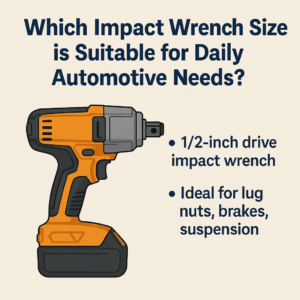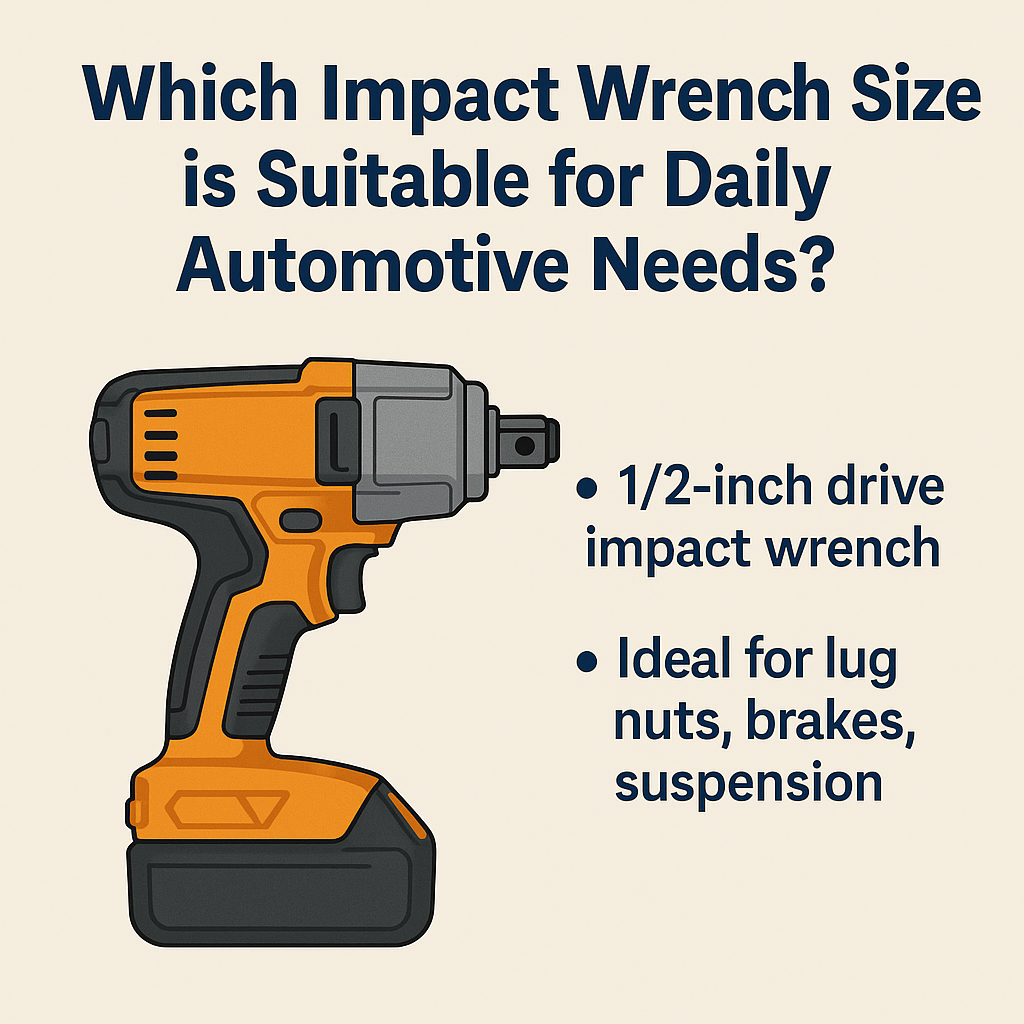When it comes to automotive maintenance, one tool that every car enthusiast or DIY mechanic must consider is the impact wrench. But with so many drive sizes available, choosing the right one can be confusing. So, which impact wrench size is suitable for daily automotive needs?
Let’s cut straight to the chase: a 1/2-inch drive impact wrench is the most suitable for daily automotive work. It offers the perfect balance of power, versatility, and affordability. But before you run out and buy one, let’s dive into the reasons why it’s the go-to choice for both professionals and beginners alike.
Understanding Impact Wrench Sizes
Impact wrenches come in various drive sizes: 1/4-inch, 3/8-inch, 1/2-inch, 3/4-inch, and 1-inch. Each size serves a unique purpose based on torque requirements and the type of task.
- 1/4-inch Drive: Ideal for light, precision tasks like small bolts or electronics. Offers around 50-150 ft-lbs of torque.
- 3/8-inch Drive: Suitable for lighter automotive tasks and tighter spaces. Torque ranges from 100-300 ft-lbs.
- 1/2-inch Drive: The sweet spot. Provides 200-600+ ft-lbs of torque, ideal for lug nuts, suspension, brakes, and general maintenance.
- 3/4-inch & 1-inch Drives: Designed for heavy-duty work, construction, and industrial use. Usually over 600 ft-lbs.

Why the 1/2-Inch Drive Wins for Automotive Tasks
1. Power & Torque
Most daily automotive tasks—like removing lug nuts, changing brakes, and working on suspension systems—require somewhere between 150 to 500 ft-lbs of torque. A 1/2-inch impact wrench hits this range perfectly. Some high-end models even go up to 1,200 ft-lbs, allowing you to handle rusted or over-tightened bolts effortlessly.
2. Versatility
From compact cars to full-size trucks, the 1/2-inch drive can do it all. It supports a wide range of sockets, both SAE and metric, and can handle about 80-95% of common automotive tasks.
3. Availability & Compatibility
This size is widely used by mechanics and available in all power formats: cordless, corded, and pneumatic. It fits most impact sockets and is compatible with standard automotive repair kits.
4. Ease of Use
Modern 1/2-inch models come with features like variable speed settings, auto-stop modes, and ergonomic designs. These make the tool beginner-friendly while still powerful enough for pros.
What About 3/8-Inch and 1/4-Inch Drives?
While 3/8-inch impact wrenches are great for tighter spots and lighter work, they lack the brute force needed for stubborn lug nuts or suspension bolts. A 1/4-inch drive, meanwhile, is best reserved for electronics or interior work and simply doesn’t cut it for real automotive maintenance.
Brand and Build Quality Matters
You don’t need to break the bank, but investing in a reputable brand can make a big difference. Brands like Milwaukee, DeWalt, Makita, Bosch, and Metabo HPT offer excellent 1/2-inch models with solid torque, long battery life, and rugged build quality.
If you’re on a budget, brands like Hercules also offer surprisingly strong performance at a lower cost. Just don’t forget to buy impact-rated sockets—they’re critical for both safety and tool longevity. read : cordless impact wrench uses 3/8-in drive vs 1/2-in drive
Air vs. Cordless vs. Electric
- Cordless: Most popular for DIYers. Offers mobility, moderate power (up to 600 ft-lbs), and convenience.
- Corded Electric: Provides consistent power but less mobility.
- Pneumatic (Air): Delivers the highest torque, but requires a compressor. Best for workshops and professionals.
How Much Torque Do You Really Need?
- Lug nuts: 80–150 ft-lbs
- Brake calipers and suspension bolts: 150–300 ft-lbs
- Stuck or rusted bolts: 400+ ft-lbs
A good 1/2-inch model can handle all of these without overkill.
Final Verdict: Which Impact Wrench Size Is Best for Automotive Work?
For anyone serious about working on cars—whether you’re maintaining your own vehicle or starting as a hobbyist—a 1/2-inch impact wrench is hands-down the most useful, powerful, and versatile choice.
It strikes the perfect balance between power and control, offers enough torque for 95% of automotive jobs, and fits easily into most toolkits.
So if you’re still asking, “Which impact wrench size is suitable for daily automotive needs?” — now you know. Go with a 1/2-inch drive, and you won’t go wrong.
Pro Tip: Don’t just buy the wrench—invest in a full socket set, get a model with adjustable speed, and always choose comfort for long-term use. Your hands (and your bolts) will thank you
FAQs
What size impact wrench is best for daily automotive use?
A 1/2-inch drive impact wrench is the best all-around size for daily automotive tasks. It offers enough torque to remove lug nuts, handle brake jobs, and work on suspension systems—making it ideal for both DIYers and professionals.
Can a 3/8-inch impact wrench remove lug nuts?
A 3/8-inch impact wrench can remove lug nuts on smaller cars if the nuts are not over-torqued. However, it may struggle with stubborn or rusted bolts. A 1/2-inch drive is more reliable for this job.
Is a cordless impact wrench powerful enough for car maintenance?
Yes, cordless 1/2-inch impact wrenches with torque above 250 ft-lbs are powerful enough for most automotive maintenance tasks. They’re convenient, portable, and beginner-friendly.
How much torque do I need to remove lug nuts?
To remove lug nuts, you’ll typically need 80 to 150 ft-lbs of torque. However, for rusted or over-tightened lug nuts, up to 400 ft-lbs may be required.
What’s the difference between 1/4″, 3/8″, and 1/2″ impact wrenches?
-
1/4-inch: Best for electronics and small screws.
-
3/8-inch: Good for light automotive and tight spaces.
-
1/2-inch: Ideal for general automotive repairs—lug nuts, brakes, suspension.
Does the brand of impact wrench matter?
Yes, reputable brands like Milwaukee, DeWalt, Makita, and Bosch offer better torque, durability, and battery life. Cheaper brands can work for light tasks but may lack consistency.

